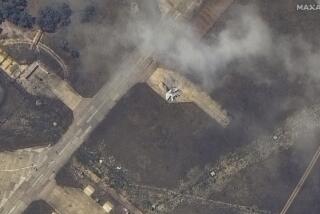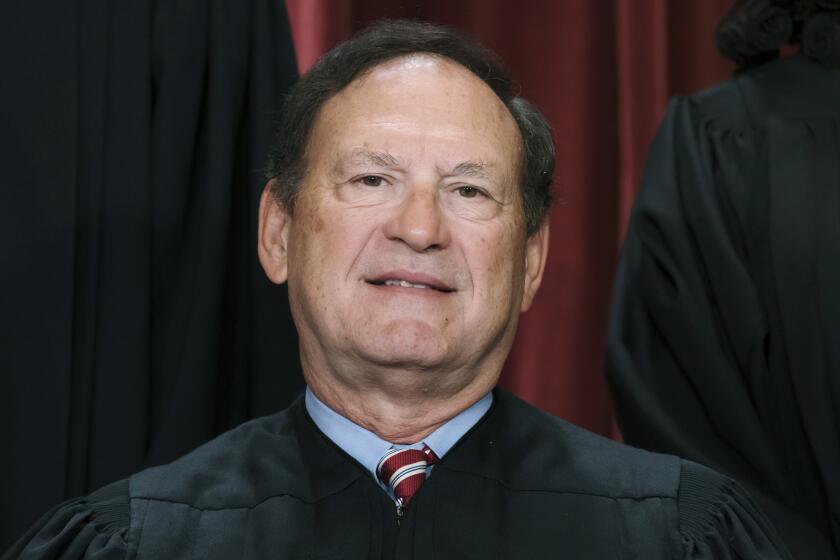Once-Stoic FBI Exhibits Evidence of Humility
The FBI--long a closed society set in its ways--now appears to be open to change, if somewhat grudgingly.
“A few things have happened recently,” FBI Deputy Director William Esposito said with more than a modicum of understatement. “It seems like they’ve all been coming to culmination about the same time.”
For months the nation’s premier law enforcement agency has been assailed not only by its longtime critics but by such normally stalwart supporters as the conservative Republican caucus on Capitol Hill.
The FBI’s top leadership has been attacked for a number of failures, some dating back as far as the 1993 confrontation with the Branch Davidian cult near Waco, Texas, others as recent as Tuesday’s announcement by the Justice Department’s inspector general that he had uncovered “serious and very significant” problems with the bureau’s once fault-free crime laboratory.
In the past, the modus operandi of the FBI always was to ignore the critics.
This time, however, FBI management not only humbly accepted the inspector general’s findings but announced that it would implement all 40 of his recommendations. The bureau said that it will appoint an outsider to run its lab and will allow an outside association of forensic lab scientists to routinely inspect its operation.
Asked whether the recent criticism, which also includes charges that the FBI has played politics to benefit the Clinton White House, affects the overall reputation of the bureau, Esposito tried to put a positive spin on the situation.
“It certainly does,” he acknowledged. “I mean, I guess a good day is when we’re not in the paper.”
But even with that mea culpa, some of the FBI’s toughest critics, like Sen. Charles E. Grassley (R-Iowa), still think that the bureau has a far stretch to go in rehabilitating its image.
“The FBI needs to show a lot more humility,” Grassley, who chairs a key subcommittee that oversees federal law enforcement, said in an interview. “Maybe this week was the start of that.”
Top GOP congressional leaders have been exceptionally harsh on FBI Director Louis J. Freeh, deriding his management style and charging that he has fallen flat on his promises to improve the FBI and make it more accountable not only to Congress, which funds its budget and oversees its mandate, but also to the public.
Indeed, Freeh’s own credibility has been at the center of much of the bureau’s problems. He has accepted some responsibility for the scandal last year in which FBI files were leaked to the White House, and he became personally involved in the FBI’s investigation into Richard Jewell, the security guard first suspected and later exonerated in the summer Olympics bombing in Atlanta.
In the midst of these troubles, Freeh has begun to wonder if his own leadership style is not doing more harm than good to the bureau he has sworn to guide and protect.
Weldon Kennedy, who recently retired as Freeh’s deputy director, said in a recent interview that Freeh has mused out loud about these concerns. But Kennedy and others do not expect Freeh to step down. It is not in him to run from a fight, they said.
“He’s taken over, he’s made tremendous strides in the bureau,” Esposito said. “He’s the one that’s opened up the FBI, that wants insiders to look at the FBI closely.”
James M. Maddock, who as the FBI’s inspector deputy general counsel often travels with Freeh, said he is amazed at the loyalty the director commands when he visits FBI field offices around the country.
But Grassley said that rank-and-file agents can see through the problems in Washington. And he said that, if Freeh and his staff try to go back to the old way of doing things inside the bureau--behind closed doors--it will only reinforce their negative opinions.
The crisis over Freeh’s leadership was most evident at a hearing last month before a House appropriations subcommittee.
Freeh’s testimony was upbeat. He outlined progress that the bureau has made, such as new initiatives for victims’ rights and anti-terrorism legislation. He also previewed such goals as improving the crime laboratory and seeking new roving wiretap authority and other crime-fighting tools.
But hardly had he finished his opening remarks when he heard from House Appropriations Committee Chairman Bob Livingston (R-La.).
“I think the leadership of the FBI has brought the entire organization into question,” Livingston told Freeh. “And you are the leader.”
Some inside the bureau, speaking on grounds of anonymity, also see problems in Freeh’s performance.
One official said that Freeh has surrounded himself with administrators who have caused young agents and the public to question his purpose.
Larry Potts, for example, an old friend and once one of Freeh’s top lieutenants, had to step down over allegations of misconduct in the FBI’s handling of a shootout at Ruby Ridge, Idaho. And Freeh’s in-house attorney, general counsel Howard Shapiro, has been taken to task for turning over sensitive FBI materials to the Clinton White House.
“Freeh’s failing is that he has been too damn loyal to some of the people he put around him,” the official said.
But it is the turmoil over the crime lab that shows how torturous it can be to change an organization founded under the autocratic leadership of J. Edgar Hoover.
As early as 1991, two years before Freeh became director, FBI officials found numerous problems with the bureau’s lab.
The in-house study found that the basest lab procedures--the logging, tracking and marking of evidence--were handled with a variety of confusing methods. Indeed, in some cases, the evidence was not marked at all.
With the start of the Freeh tenure, bureau officials began to seriously consider how to improve the lab. Experts, examiners, scientists and technicians at the lab were handling about 600,000 cases a year.
Milt Ahlerich, a career FBI agent who at that time was running the lab, met with Freeh in 1994 to discuss outside accreditation. And while another internal review of the lab in 1994 did not highlight major problems or lead to sweeping changes, Ahlerich said that the bureau was moving in its own way to make corrections.
“Some people were counseled, and some were disciplined and rated down,” he said.
To gauge the severity of the problems, he said, lab management began doing “blind tests” in which examiners were given projects to work on that had already been analyzed in state laboratories.
“We watched them closely, and it turned out they were doing extremely well,” he said.
But Justice Department Inspector General Michael Bromwich said that the FBI would never have moved as quickly in fixing the lab if it had not been for the exhaustive 18-month review by his office.
Esposito promised a thorough internal review to see how the bureau got to where it is now and where it should go in the future. But asked whether he would then be willing to discuss publicly what shortcomings were found, Esposito slipped back into the language of the FBI of old.
“No, I’m not,” he said.
More to Read
Start your day right
Sign up for Essential California for news, features and recommendations from the L.A. Times and beyond in your inbox six days a week.
You may occasionally receive promotional content from the Los Angeles Times.







